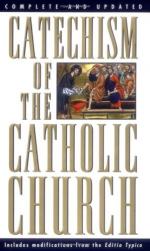
|
| Name: _________________________ | Period: ___________________ |
This test consists of 15 multiple choice questions and 5 short answer questions.
Multiple Choice Questions
1. The power of water to purify and to cleanse was also advanced by what?
(a) The flood and the time of Noah.
(b) The rainfalll that takes place around the world.
(c) The amount of water found in the oceans.
(d) The falling of manna from the sky.
2. How are options for the earthly life divided?
(a) Into healthy and unhealthy.
(b) Into life and salvation or destruction.
(c) Into love and hate.
(d) Into happiness and unhappiness.
3. Is Baptism open to people of any religion?
(a) Yes, those who are willing to be initiated by it.
(b) No, only Catholics.
(c) No, only Christians.
(d) Yes, anyone and everyone.
4. What is the emphasis regarding Holy Orders and Matrimony?
(a) Service to another or to others and to the salvation of the other.
(b) Service to another and the salvation of oneself.
(c) Service to oneself for the sake of others.
(d) Service to oneself for the sake of oneself.
5. Such a choice to not marry would preclude what?
(a) Dating.
(b) Becoming engaged.
(c) Adopting children.
(d) Having sexual relations.
6. To what does the third commandment pertain?
(a) Keeping the Sabbath.
(b) Coveting.
(c) Obeying thy father and mother.
(d) Loving thy neighbor as thyself.
7. What does Baptism do?
(a) It makes families happy.
(b) It washes away sins from an entire family.
(c) It makes a person wet.
(d) It washes away sins.
8. What is repentance?
(a) To work at correcting or improving behavior in order to achieve a higher standard.
(b) Sinless behavior.
(c) An apology.
(d) Complete forgiveness for sins.
9. What is the fourth commandment?
(a) Thou shalt not commit adultery.
(b) Obey thy father and they mother.
(c) Love thy neighbor as thyself.
(d) Thou shalt not kill.
10. Why is the cultivation of superior moral character by practicing precepts often still of great benefit to the baptized?
(a) The purification does not significantly alter an individual's nature or disposition.
(b) The purification of baptism lasts forever.
(c) Those who are baptized are perfect and sinless.
(d) The baptized must help all others.
11. Freedom within the spectrum of choices that "fall amongst the good" is only furthered and enhanced by what?
(a) Intimacy with others.
(b) Intimacy with oneself.
(c) Intimacy with Christ.
(d) Intimacy with the Church.
12. From whom is prayer a gift?
(a) The Apostles.
(b) Adam and Eve.
(c) God.
(d) One's parents.
13. As what is Confirmation also known?
(a) Christmas.
(b) Chrismation.
(c) Catechism.
(d) Christendom.
14. About what is the third article?
(a) Freedom and responsibility.
(b) Free will and love.
(c) Freedom and power.
(d) Love and glory.
15. What is healthy self-love?
(a) Hurting oneself for the sake of others.
(b) Caring only about oneself.
(c) Loving others to the extreme.
(d) Not selfish nor self-abusive.
Short Answer Questions
1. What follows Confession?
2. What is the downside of unconditional love?
3. Israel crossing the Red Sea and the River Jordan and arriving in the promised lands are also recognized as what?
4. What is the term used in the context of specific requests for love and dedication on the levels of mind and heart and through action?
5. The first article here is about what?
|
This section contains 561 words (approx. 2 pages at 300 words per page) |

|




